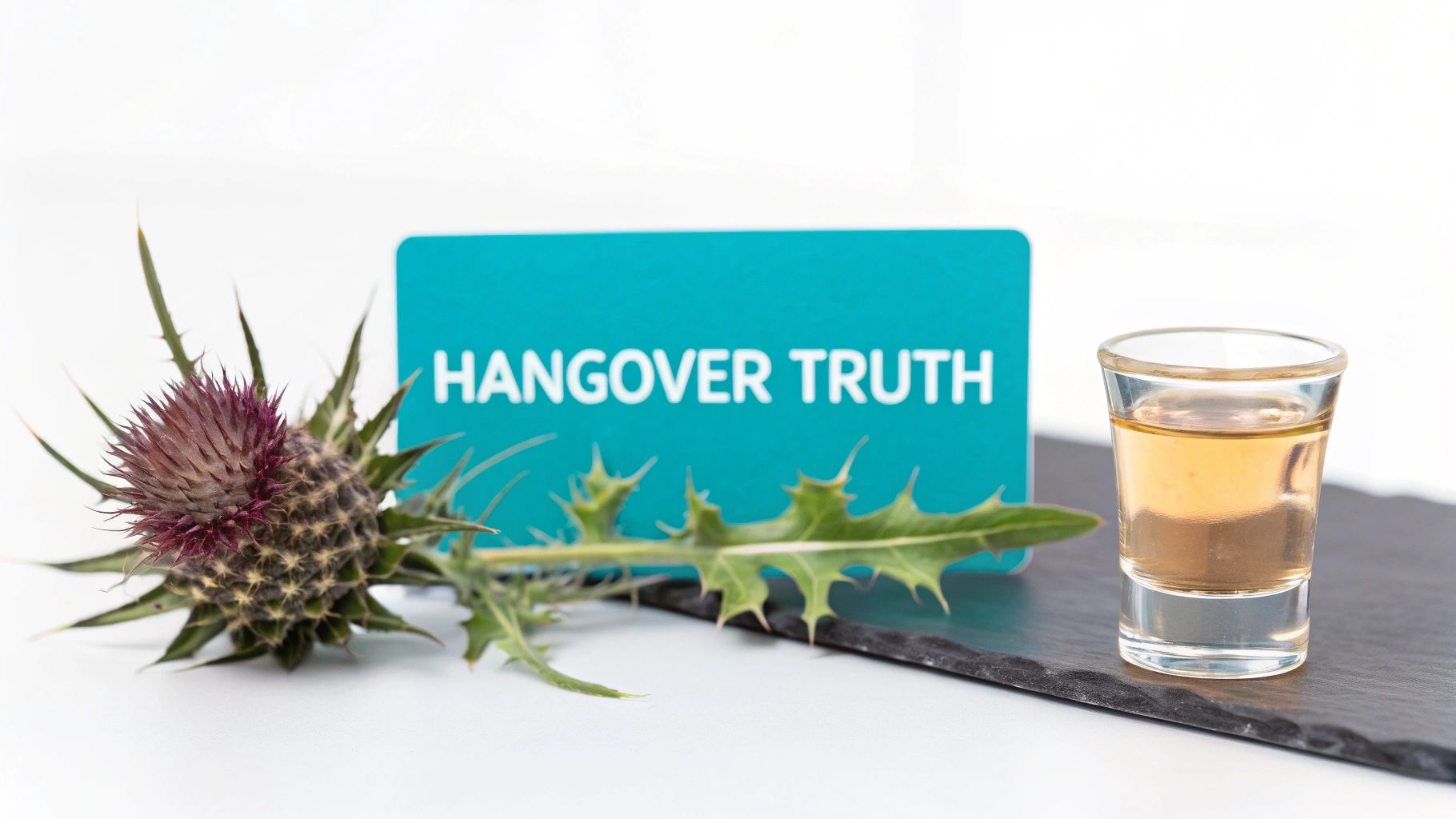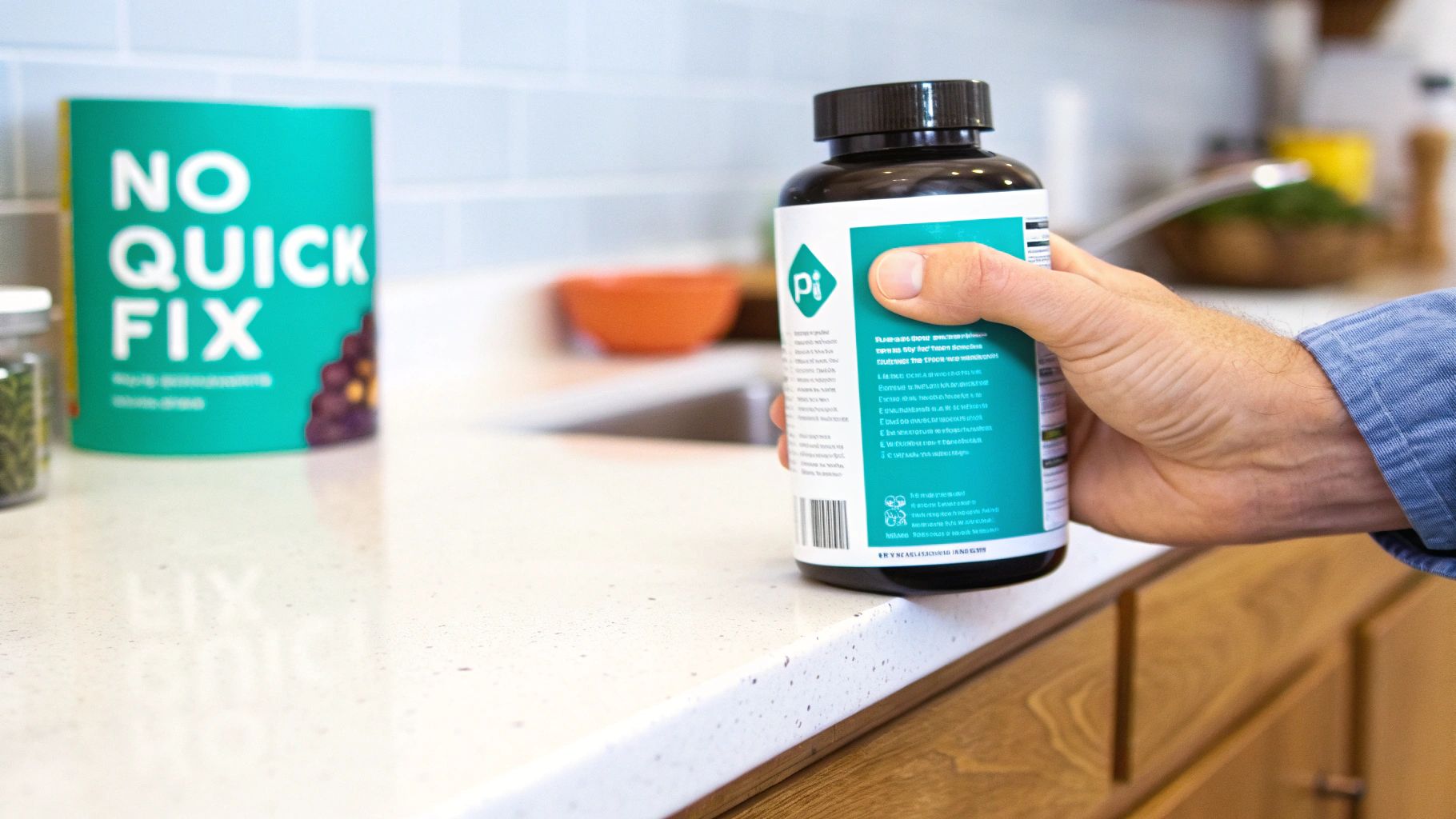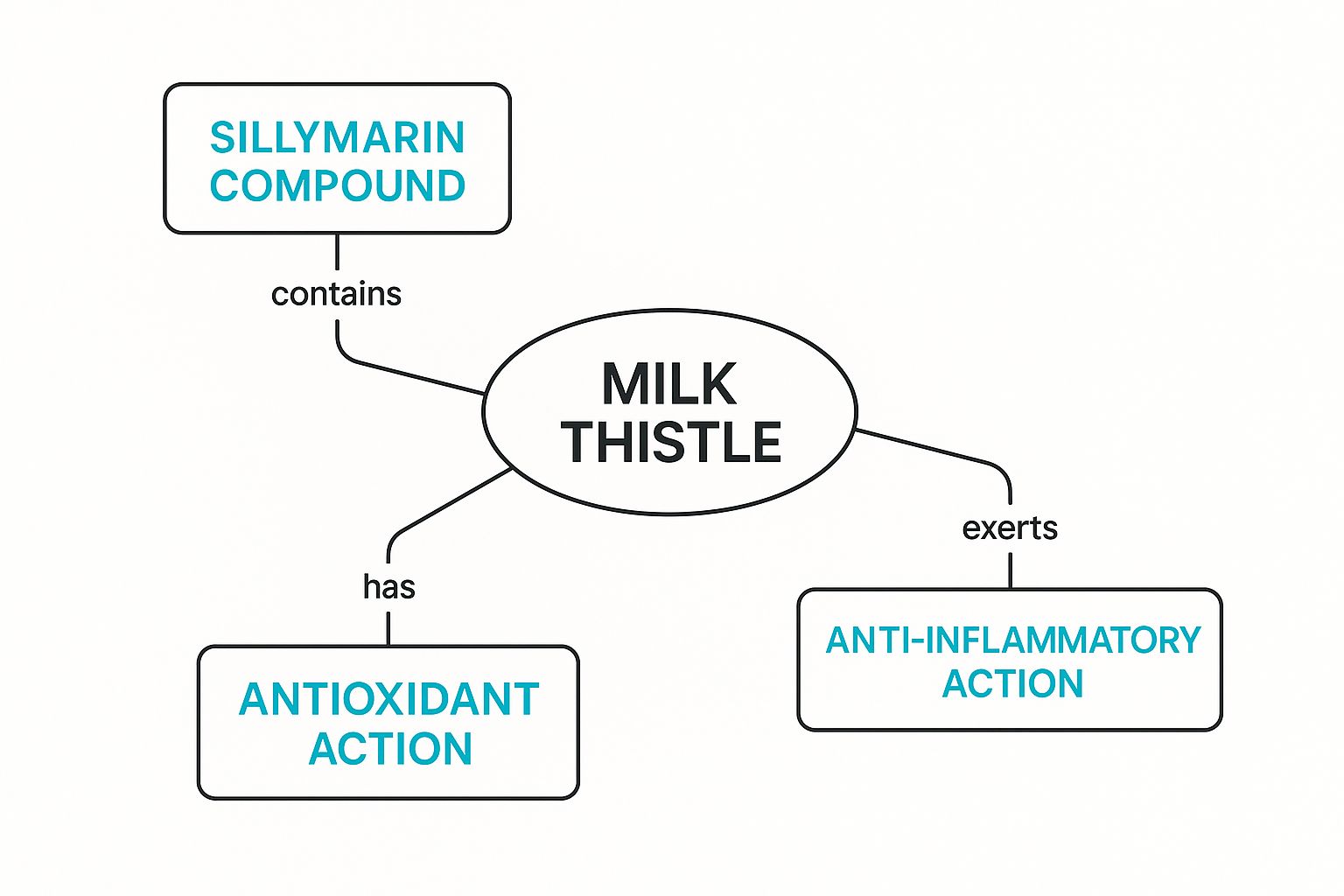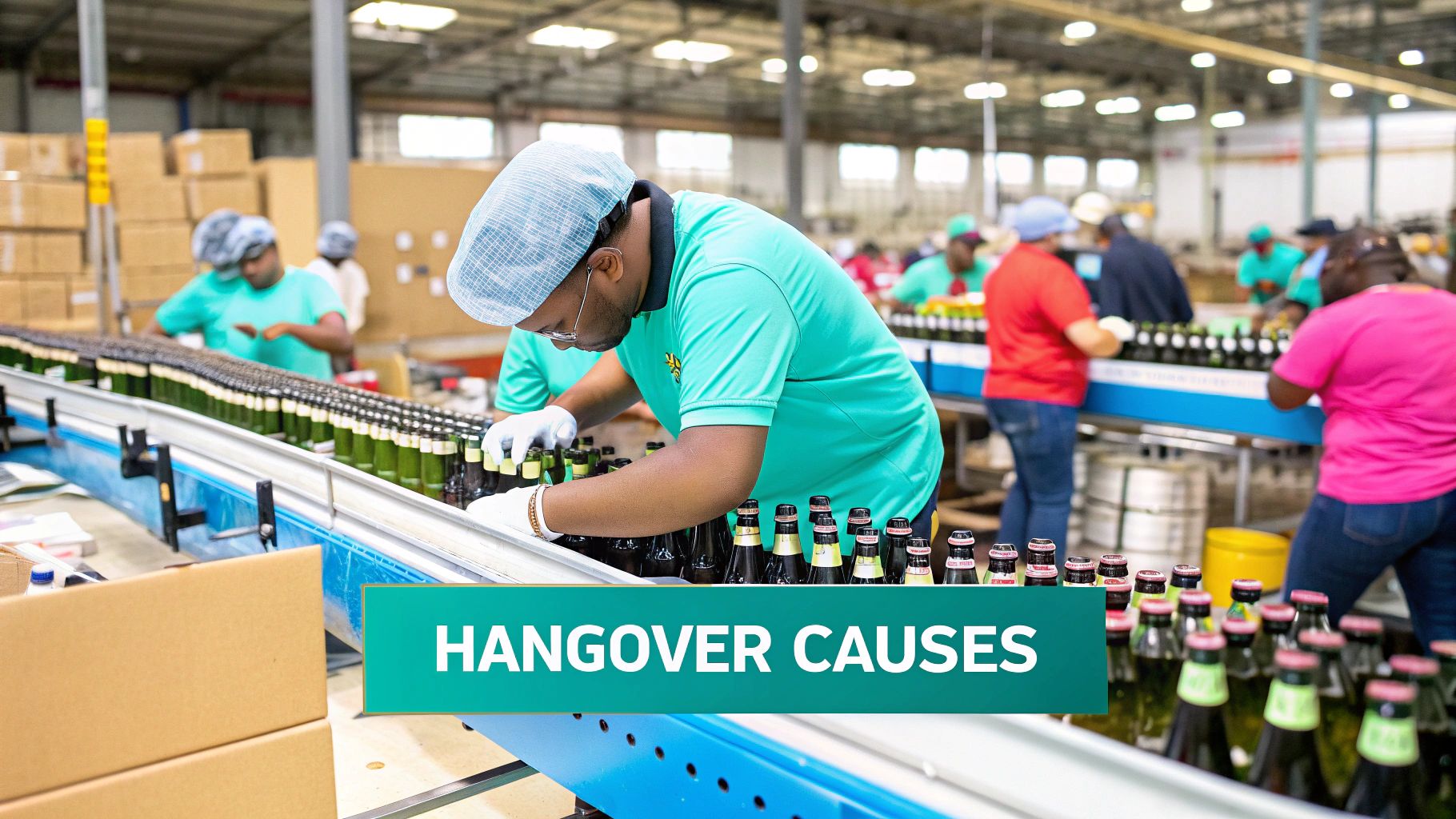

· By Annemarie
Does Milk Thistle Help a Hangover? The Real Answer
When you’re desperately searching for an answer to the age-old question, "Does milk thistle actually help a hangover?" you want a straight-up verdict. So, let’s cut to the chase.
While milk thistle has a rock-solid reputation for liver health, current science shows it's not an effective remedy for immediate hangover symptoms. It won’t touch that pounding headache, wave of nausea, or the all-too-familiar morning grogginess. Think of it as a supportive player for your liver's long-term wellness, not a quick fix for the morning after a few too many.
Setting the Record Straight on Milk Thistle and Hangovers

The link between milk thistle and alcohol often leads people to believe it must be some kind of secret-weapon hangover cure. This idea comes from its main active compound, silymarin, which is well-studied for its ability to protect liver cells. But here’s the thing: there's a huge difference between long-term liver support and short-term hangover relief.
Imagine your liver is a pro marathon runner. Milk thistle acts like a long-term conditioning coach, helping the runner stay in peak shape over a whole season of races. A hangover, on the other hand, is like the muscle soreness and sheer exhaustion you feel right after one single, grueling race. The coach’s training plan isn't designed to instantly erase that acute, post-race pain.
Understanding the Hype vs. Reality
So, why do you see milk thistle in so many "hangover" products if it doesn't really tackle the immediate symptoms? The logic is all about its well-known benefits for the liver—the very organ that has to metabolize all that alcohol.
Silymarin is thought to offer:
- Antioxidant Effects: It helps fight oxidative stress, a type of cellular damage that drinking can put into overdrive.
- Liver Protection: It may help strengthen liver cell walls, making them more resilient against toxins.
- Anti-Inflammatory Properties: It can help calm down inflammation, which is a major reason you feel so crummy during a hangover.
These all sound great on paper, but they don't directly address the immediate, ugly aftermath of a big night out. Milk thistle’s game is all about general liver health, not a direct counter-attack on your hangover.
To put it plainly, here's a quick breakdown of what milk thistle is said to do for hangovers versus what the science actually supports.
Milk Thistle for Hangovers at a Glance
| Claimed Benefit | Scientific Evidence for Hangovers | Primary Mechanism |
|---|---|---|
| Reduces Headaches | Lacking. No direct studies show it helps hangover headaches. | Indirectly anti-inflammatory, but not targeted for this symptom. |
| Eases Nausea | Lacking. No evidence it calms an upset stomach from alcohol. | Focuses on liver cell health, not the gut or brain signals causing nausea. |
| Prevents Liver Damage | Supportive. Shows promise for long-term liver protection. | Silymarin helps fortify liver cells and fight oxidative stress. |
| Boosts Recovery | Minimal. Does not speed up the breakdown of alcohol or its byproducts. | Works on a cellular level over time, not on immediate metabolic processes. |
The bottom line? The expert consensus is clear: we’re still waiting on solid human studies that prove milk thistle can significantly knock out typical hangover symptoms. If you want to dig deeper into the science behind milk thistle for hangovers, you'll see why it just doesn't make the cut for fast relief.
#upside #enjoyupside #upsidejelly #livemore #hangovercure #hangoverprevention #fighthangovers #preventhangovers #HangoverRelief #MorningAfter #PartySmarter #HydrationStation #WellnessVibes #RecoverFaster #NoMoreHangovers #HealthyParty #HangoverHacks #FeelGoodMorning #NightlifeEssentials #HangoverFree #SupplementGoals #PostPartyPrep #GoodVibesOnly #HealthAndParty #HangoverHelper #UpsideToPartying
What Exactly Is Milk Thistle?
You've probably seen milk thistle supplements in the wellness aisle and wondered what all the fuss is about. To get why it's not the magic bullet for a hangover, you first need to understand what this popular herb actually does.
Milk thistle, or Silybum marianum if you want to get scientific, is a flowering plant that’s been a staple in traditional medicine for centuries. Its claim to fame? Supporting the liver.
The real hero inside milk thistle is a group of powerful plant compounds called silymarin. This is the active ingredient doing all the heavy lifting and delivering most of the health benefits people talk about. Silymarin is actually a mix of several flavonoids, which are just nature's fancy way of saying "really strong antioxidants."
The Powerhouse Within: Silymarin
Imagine your liver is a city's main water filtration plant, working 24/7 to clear out junk and keep everything running. In this analogy, silymarin acts like a dedicated security team for that plant. It guards the cell walls and helps neutralize threats before they can cause any real damage.
This is a simple breakdown of what's going on inside the herb.

As you can see, milk thistle’s benefits come straight from silymarin’s one-two punch of antioxidant and anti-inflammatory support. That’s why it’s so tightly linked to liver health.
These properties are what have cemented milk thistle's reputation as the go-to supplement for keeping your liver happy. It’s not about an instant fix; it’s about playing the long game and offering protection for one of the hardest-working organs in your body.
Key Insight: Silymarin isn’t just one thing—it’s a whole team of potent compounds. This complex is what gives milk thistle its power, mainly by protecting liver cells from long-term oxidative stress and inflammation.
So, Why Do People Link It to Alcohol?
The jump from liver support to hangover cure makes sense, even if it’s a little off the mark. Your liver is ground zero for metabolizing alcohol, so the thinking is: support the liver, and you’ll automatically dodge a hangover. Right?
Well, not exactly. Silymarin’s main jobs include:
- Antioxidant Action: Processing alcohol creates a ton of oxidative stress, which is basically cellular damage. Silymarin is great at neutralizing the troublemakers—harmful free radicals.
- Anti-inflammatory Properties: That pounding headache and general misery? A lot of that is inflammation. Silymarin helps cool down the inflammatory response in the liver.
- Cellular Support: Some studies suggest it can even help liver cells regenerate by boosting protein synthesis.
These are all fantastic benefits for your liver's overall well-being, but they’re geared toward managing chronic stress. A hangover, on the other hand, is acute, multi-system chaos.
Milk thistle is more of a guardian, not a crisis manager. For a deeper dive into what it does best, you can learn more about using milk thistle for a liver detox to support its long-term health.
#upside #enjoyupside #upsidejelly #livemore #hangovercure #hangoverprevention #fighthangovers #preventhangovers #HangoverRelief #MorningAfter #PartySmarter #HydrationStation #WellnessVibes #RecoverFaster #NoMoreHangovers #HealthyParty #HangoverHacks #FeelGoodMorning #NightlifeEssentials #HangoverFree #SupplementGoals #PostPartyPrep #GoodVibesOnly #HealthAndParty #HangoverHelper #UpsideToPartying
Understanding the Science of a Hangover

To figure out why some hangover remedies are lifesavers and others are just wishful thinking, you have to pop the hood and see what’s actually going on in your body. That morning-after misery is way more complicated than just being thirsty. Sure, dehydration is part of it, but it’s just one piece of a much bigger, body-wide mess.
A hangover is basically a multi-front attack on your system, fueled by a few key troublemakers that team up to make you feel like garbage. It’s less of a single problem and more of a perfect storm of biological chaos.
The Real Culprits Behind Your Misery
When you're feeling the full, crushing weight of a hangover, your body is juggling several problems at once. It’s not just a lack of water; it’s a whole chain reaction kicked off by alcohol.
These are the main offenders:
- Inflammation: Your immune system sees alcohol as a threat and fires up an inflammatory response. This is what causes that general feeling of being unwell, achy, and unable to focus.
- Sleep Disruption: Alcohol might knock you out fast, but the quality of that sleep is terrible. It torpedoes your REM sleep—the most restorative stage—which is why you can sleep for eight hours and still wake up feeling completely drained.
- Gastrointestinal Distress: Alcohol is a major irritant to your stomach and intestines. It cranks up stomach acid production, slows down digestion, and is the direct cause of that lovely nausea, stomach pain, and vomiting.
But while all that is going on, the main event is happening in your liver. This is where the true villain of the hangover story is born.
The Liver's Overload Problem
Think of your liver as your body’s main filtration plant, tasked with breaking down all kinds of junk, including alcohol. When you have a drink, enzymes in your liver get to work, converting the alcohol (ethanol) into a compound called acetaldehyde.
Here’s the kicker: acetaldehyde is estimated to be between 10 to 30 times more toxic than alcohol itself. It's a nasty, highly reactive chemical that causes a ton of oxidative stress and damages your cells.
Imagine your liver is a factory with an assembly line for processing waste. A couple of drinks come in, and the line handles it just fine. But after a big night out, the factory gets flooded. The assembly line can't keep up, creating a massive bottleneck. Acetaldehyde is the toxic sludge that piles up during this backup.
This toxic buildup is a huge reason you feel so awful. Your body has a second-stage enzyme to break acetaldehyde down into something harmless, but it's a much slower worker. When you're drinking heavily, acetaldehyde builds up way faster than your system can clear it, letting this toxin run wild and wreak havoc.
Understanding this process is everything. It shows you why a real hangover helper needs to support your liver's metabolic process, not just put a band-aid on the symptoms.
Does Milk Thistle Actually Help with Hangovers? Let's Look at the Evidence.
Now that we have a good idea of how a hangover completely dismantles your body, let's connect the dots. Does milk thistle’s legendary liver-protective reputation actually translate into real, noticeable hangover relief? This is where the marketing promises often crash head-on into scientific reality.
There's no denying milk thistle's popularity in the hangover remedy space. But here's the catch: its good name is built almost entirely on its benefits for chronic liver support, not for fighting the immediate, full-body chaos of a hangover. The actual evidence for preventing a rough morning after is surprisingly thin.
The Big Gap Between Popularity and Proof
You'll spot milk thistle on the ingredient list of countless "morning after" supplements, which definitely makes it seem like a proven fix. In fact, one study found that milk thistle extract is used in a whopping 47.8% of hangover products on the market. But despite being everywhere, solid, placebo-controlled human trials have repeatedly failed to show it does much of anything to prevent or reduce hangovers. You can read the full research on hangover supplement ingredients yourself to see how many popular remedies just don't have the science to back them up.
#upside #enjoyupside #upsidejelly #livemore #hangovercure #hangoverprevention #fighthangovers #preventhangovers #HangoverRelief #MorningAfter #PartySmarter #HydrationStation #WellnessVibes #RecoverFaster #NoMoreHangovers #HealthyParty #HangoverHacks #FeelGoodMorning #NightlifeEssentials #HangoverFree #SupplementGoals #PostPartyPrep #GoodVibesOnly #HealthAndParty #HangoverHelper #UpsideToPartying
This huge divide between what's popular on the shelf and what's proven in the lab is something everyone should know about. Just because an ingredient is common doesn't mean it’s the right tool for the job you need it to do.
Chronic Support vs. Acute Relief
The real issue boils down to timing and what the ingredient is actually doing. Milk thistle works over the long haul, helping protect liver cells from day-to-day stress. A hangover, on the other hand, is an immediate, intense crisis.
Think of it like this: taking milk thistle is like doing regular maintenance on the fire alarms in a building. It's a smart, preventative measure for long-term safety. A hangover is the fire itself—and at that point, you don't need an alarm inspection, you need firefighters.
Key Takeaway: Milk thistle’s benefits are all about prevention and build up over time for general liver health. It’s not built to jump in and stop the immediate biochemical storm of a hangover, which is a nasty mix of inflammation, dehydration, sleep disruption, and toxic buildup happening all at once.
To really tackle a hangover, a supplement needs to hit those acute problems head-on. That means it needs to:
- Speed up metabolism: Help your body process alcohol and its toxic byproduct, acetaldehyde, way more efficiently.
- Reduce inflammation: Calm down the immune response that’s causing those aches and headaches.
- Replenish nutrients: Get those electrolytes and vitamins you lost back into your system, fast.
Milk thistle just isn't equipped to handle these urgent tasks. Understanding the difference between a general wellness supplement and a targeted, fast-acting solution is everything. For more on this, you can check out our guide on finding the best liver supplements for alcohol to learn what really works. It’s all about getting past the hype and focusing on what your body actually needs in the moment.
#upside #enjoyupside #upsidejelly #livemore #hangovercure #hangoverprevention #fighthangovers #preventhangovers #HangoverRelief #MorningAfter #PartySmarter #HydrationStation #WellnessVibes #RecoverFaster #NoMoreHangovers #HealthyParty #HangoverHacks #FeelGoodMorning #NightlifeEssentials #HangoverFree #SupplementGoals #PostPartyPrep #GoodVibesOnly #HealthAndParty #HangoverHelper #UpsideToPartying
Smarter Ways to Prevent a Hangover

Alright, so if milk thistle isn’t the magic bullet for hangovers, what actually works? Let's get real. Truly sidestepping a hangover isn't about some miracle cure you take the morning after—it's about having a smart, proactive game plan before you even start drinking.
We all know the classic rules, and they're non-negotiable for a reason. Hydrating throughout the night, eating a real meal beforehand, and pacing yourself aren't just old wives' tales; they are the absolute pillars of a better morning. These simple moves tackle the core problems head-on: they fight dehydration, slow down how fast your body absorbs alcohol, and give your liver a much-needed break.
Building a Modern Prevention Plan
But while the basics are crucial, you can seriously upgrade your strategy by bringing in some modern science. Instead of just bracing for impact, you can give your body the tools it needs to process alcohol more efficiently from the get-go.
This is where next-level ingredients like Dihydromyricetin (DHM) and N-Acetylcysteine (NAC) enter the picture. They don't just put a bandage on the symptoms; they go straight to the root of the problem—that nasty acetaldehyde toxin we’ve been talking about.
Think of it like this: the classics (water, food, pacing) are your city's basic defense walls. Ingredients like DHM and NAC are the specialized cleanup crew you call in to neutralize the main threat before it can tear the place apart.
The Smarter Approach: An effective hangover prevention plan is a one-two punch. It combines those foundational habits with targeted nutritional support, creating an internal environment that’s primed to metabolize alcohol and its toxic junk, stopping the damage before it even starts.
Key Ingredients That Make a Difference
Knowing what these powerful ingredients do is the key to building an ironclad defense. Each one has a specific, science-backed job to help your body handle a night out.
Here’s a rundown of the heavy hitters in modern hangover prevention:
- Dihydromyricetin (DHM): This natural flavonoid is a total game-changer. It works by boosting the enzymes that break down alcohol and, more importantly, that super-toxic acetaldehyde. By speeding up this process, DHM helps flush the toxic sludge out of your system faster, so it has less time to wreak havoc.
- N-Acetylcysteine (NAC): Your body's master antioxidant is a substance called glutathione, and drinking absolutely tanks your supply of it. NAC is a precursor to glutathione, meaning it helps your body restock its antioxidant arsenal to fight off all that oxidative stress.
- Electrolytes: Alcohol is a diuretic, which is a fancy way of saying it makes you pee out fluids and essential minerals like sodium and potassium. Topping up your electrolytes is critical for getting your hydration back in balance, which helps kick headaches, fatigue, and muscle cramps to the curb.
- B Vitamins: These guys are essential for producing energy, and your body burns through them like crazy when it's metabolizing alcohol. Replenishing them helps combat that classic morning-after brain fog and fatigue.
When you focus on these smarter, science-backed strategies, you're moving past wishful thinking. A plan that includes hydration, a solid meal, and the backup of targeted ingredients—like the ones in Upside Hangover Sticks—gives your body everything it needs to party smarter and wake up feeling human again.
How to Use Supplements Safely
Whether you’re eyeing milk thistle for your liver or another supplement for general wellness, knowing how to use them correctly is everything. Let's be real—the supplement aisle can feel like the Wild West, packed with huge promises and confusing labels. A smart approach isn't just a good idea; it's non-negotiable if you want results without the risks.
It all starts with picking a high-quality product. Not all supplements are made equal, and some are loaded with useless fillers or have inconsistent doses. Always go for brands that are upfront about where their ingredients come from and how their products are made.
Finding Quality and Understanding Dosing
Choosing a reputable source is your first line of defense against sketchy or ineffective products. A quick pro-tip is to look for third-party certifications (like NSF or USP) on the label. This is an easy way to verify that what’s advertised on the bottle is actually in the bottle, ensuring the product meets some pretty strict quality standards.
But here’s the golden rule, and it's a big one: always, always talk to a healthcare professional before adding anything new to your routine. They can give you personalized advice based on your health history and help you steer clear of any negative interactions.
Just as important is knowing what you're actually looking at on the bottle. Learning how to read supplement labels is a skill that puts you in the driver's seat.
#upside #enjoyupside #upsidejelly #livemore #hangovercure #hangoverprevention #fighthangovers #preventhangovers #HangoverRelief #MorningAfter #PartySmarter #HydrationStation #WellnessVibes #RecoverFaster #NoMoreHangovers #HealthyParty #HangoverHacks #FeelGoodMorning #NightlifeEssentials #HangoverFree #SupplementGoals #PostPartyPrep #GoodVibesOnly #HealthAndParty #HangoverHelper #UpsideToPartying
It helps you spot the active ingredients, check for allergens, and make sure you’re taking the right amount.
Potential Side Effects and Interactions
Even "natural" supplements can have side effects or mess with medications you’re taking. For instance, while milk thistle is generally considered safe for most people, it can cause some digestive upset. It might also interact with certain prescription drugs, like some used for diabetes or high cholesterol.
Being aware of these possibilities is key to using supplements safely. Pay attention to how your body feels when you start something new. If anything seems off, don't hesitate to stop and check in with your doctor. This proactive mindset is what ensures your efforts to feel better are both effective and genuinely safe.
Alright, you've got questions about milk thistle, and we've got answers. When it comes to figuring out if this herb can actually help after a night of drinking, a few common points always seem to pop up.
Let's clear the air and give you some straightforward answers.
Should I Take Milk Thistle Before or After Drinking?
This is probably the biggest question people have. For general liver support, milk thistle is really meant to be a daily supplement, not a one-and-done fix you take right before a night out.
Its potential benefits build up over time. Popping a dose right before your first drink or after your last one hasn't been shown to prevent or knock out hangover symptoms in the short term.
Can Milk Thistle Repair Alcohol-Related Liver Damage?
While some studies hint that milk thistle can help protect liver cells and calm inflammation in certain chronic liver conditions, it is not a cure for alcohol-related liver disease. Let's be really clear about that.
The only proven way to stop and maybe even reverse damage from alcohol is to seriously cut back or stop drinking completely and talk to a medical professional.
Important Takeaway: Think of milk thistle as a supportive player for your liver's long-term wellness, not an emergency fix for a nasty hangover or a magic bullet for serious liver damage.
So, What Supplements Are Actually Proven to Help Hangovers?
Here's the real talk: right now, no supplement is scientifically proven to "cure" a hangover. But, some ingredients are showing a lot of promise. Dihydromyricetin (DHM), for example, seems to help the body process alcohol byproducts more efficiently.
Beyond that, things like electrolytes and B vitamins are key for getting rehydrated and bringing your energy levels back from the dead. The best game plan will always be moderation, drinking plenty of water, and getting a good night's sleep.
For a smarter, science-backed approach to your next night out, give your body the targeted support it actually needs. Upside Hangover Sticks are loaded with DHM, electrolytes, and essential vitamins designed to help you wake up feeling more like yourself. Check out the formula and see what the hype is all about.
